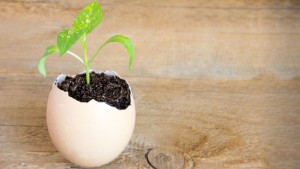Source: mnn.com
Published: June 10, 2014

Eggshells make great compostable seedling containers. (Photo: Oksana Bratanova/Shutterstock)
Before you throw out those scraps, consider their uses in the garden, kitchen and more.
My introduction to recycling came in my grandmother’s garden. Granddad was a big-city veterinarian who, years ahead of this century’s homesteading movement, decided to buy a farm and leave urban life behind, turning to the treatment of cows and horses rather than cats and dogs. Reluctant at first to leave her familiar environment, Grandma eventually adapted. In fact she thrived in the country, raising border collies and cultivating her own organic vegetables.
During a summer visit to the farm as a curious five-year-old, I loved to follow Grandma as she tended her garden. When I asked why she was sprinkling “smushed” eggshell around the base of her tomatoes, she explained that it helped the plants to grow. I was amazed by the notion that food – in this case, the fledgling tomatoes – also needed to be fed.
A lot of summers have passed since that July day and the benefit of using eggshells as garden fertilizer is now widely known. In fact, gardeners and green homemakers have discovered many more ways to repurpose this humble item. Here are a few that would make Grandma smile.
Of course, the first thing that comes to mind is using eggshells in the garden. Whether mixed with your compost pile or deposited directly into the planting hole, crushed eggshells will nourish your fast-growing vegetables with calcium. Addition of this mineral helps prevent blossom-end rot in tomato plants and brown spots in both tomatoes and peppers.
Add nutrients to potting soil
As a would-be farmer limited by the fact that I live in a fair-sized city, I riff on Grandma’s time-tested idea with my houseplants, mixing coarsely broken eggshell into the potting soil. These larger bits break down more slowly and provide drainage as well as nutrients.
Compostable seedling containers
To give garden plants a head start while the weather is still wintry outdoors, sow seeds in eggshell halves with a little earth. The seedlings that sprout may be transplanted directly into your garden, “container” and all.
Control garden pests
Chunks of eggshell spread in the garden are also an effective slug and cat repellent … due not to any chemical properties but rather to their sharp edges! (Obviously the pieces will need to be replaced as they wear down.)
Clarify liquids
Eggshells don’t have to be limited to the garden, however. In the kitchen, eggshell crumbs work to clarify liquids ranging from coffee to soup stock to homemade wine. Whenever you use eggshells for a food-related purpose, it is best to wash them and/or heat in the oven for a few minutes first. (No need to waste electricity or gas to do so. Put a pan full of eggshells in the oven together with your baking.)
Prevent clogs
Placing chunks of eggshell in your sink strainer will help catch food particles and prevent them from clogging your plumbing. In fact, some folks recommend pouring crushed eggshells directly down the drain to clear your pipes. But be warned that eggshells in your sink drain – or garbage disposal – can do a lot more harm than good.
Scrub pots and pans
A highly touted use for eggshell, as an all-natural scrub for gunky pots and pans, sounds good in theory but has a high potential mess factor (especially in my “mess magnet” household). Make sure you strain out the leftover bits and pieces before draining the dirty water.
Laundry whitener
Another eggshell app is a laundry whitener. Thrown in with your wash, the shells will brighten dingy formerly-whites. Put shell pieces into a closed, tightly woven fabric bag to avoid damage to your washing machine.
Calcium supplements
Did you know you can eat eggshells, too? Eggshells, particularly organic ones, are a good, cheap source of calcium for humans, chickens and dogs. Bake to sterilize and grind into powder. (Check with your vet before giving a puppy calcium supplements. Canines under 9 months can’t excrete excess calcium, which may be very dangerous to normal bone development.) As “people food,” the shells may be soaked in lemon juice or vinegar for enhanced absorption; strain and use the liquid in salad dressing.
Beauty products
Don’t throw out the sludge left from your straining! Smooth it on your skin as a fantastic all-natural facial or hand softener.
Relieve itching and pain
Eggshells have healing properties as well. The liquid that results from macerating eggshells in apple cider vinegar may be used to treat itchiness and other minor skin irritations. Currently, the delicate membrane found just inside the eggshell is being researched for its role in relieving the pain and stiffness associated with arthritis, osteoporosis and similar disorders.
Laura Firszt originally wrote this story for networx.com.
